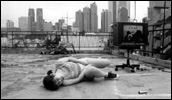The Glamorous Life of Sachiko Hanai
- Year
- 2003
- Original title
- Hanai Sachiko no Karei na Shogai
- Japanese title
- 花井さちこの華麗な生涯
- Alternative title
- Horny Home Tutor: Teacher's Love Juice
- Director
- Cast
- Running time
- 90 minutes
- Published
- 21 October 2007



by Dean Bowman
Before discussing The Glamorous Life of Sachiko Hanai by Mitsuru Meike it might be prudent to consider the peculiar story of its journey from the far from glamorous sex theatres of Tokyo to the relative respectability of Cinema Village in New York, where it recently became the first pink film to gain a theatrical release in the American art cinema circuit.
Although the film was conceived within the Japanese adult film industry and titled Horny Home Tutor: Teacher's Love Juice (included on the recent DVD release by Palm), constituting an example of the genre known as the pinku eiga that accounts for a large and oft neglected percentage of national production, its director, like many pink filmmakers before him, had higher ambitions. As with the work of former provocateurs Koji Wakamatsu and Masao Adachi (Go, Go Second Time Virgin / Yuke Yuke Nidome no Shojo, 1969, Ecstasy of the Angels / Tenshi no Kokotsu, 1972) working in the heady days of the late sixties when the genre was in its unpredictable beginnings, Meike has attempted to use the relative creative freedom of the marginal pink industry to create a political critique imbedded in an experimental surrealist narrative.
The far more intriguing current title came about when a director's cut (incorporating extra material bringing the film from the paltry 65-minute running time typical of the genre to a respectable hour and a half) was given its premiere at the 2005 edition of the Nippon Connection Japanese film festival in Frankfurt, and the festival programmers had to come up with an appropriate international title. Thanks to the success of the screening there the film was shown at a number of other festivals and given DVD releases in several countries including Germany and America. The exodus of this film, and how its status shifted from pornography to art in the process, says a lot about how a film's meaning alters with context as well as how influential the international festival circuit can be in rebranding films as it disseminates them to new audiences. By all accounts The Glamorous Life should have disappeared without trace into the transient ocean of sex films that rarely trickle out of Japan, but instead it was plucked from oblivion to join the ranks of the small body of Japanese films each year considered worthy of international attention.
As cynical and selective as this process can be sometimes, this is an instance in which we should be thankful to it, because The Glamorous Life arrives on the scene like a breath of fresh air and will undoubtedly ruffle the feathers of many a complacent spectator. To its credit it is impossible for The Glamorous Life to be completely incorporated into the standardised meta-genre of the international festival film, for it will always bear the unavoidable characteristics of its genre, namely its attempt to titillate. These erotic credentials problematise its containment in safe categories, just as its political content prevents it from being dismissed merely as filth. Despite its failings (it has to be said that it is not the most polished of films) it joins some of the best works in standing out amidst the sea of neatly digestible products, making you marvel at the fact of its existence.
Although the opening scene, in which buxom home tutor Sachiko Hanai seduces her ardent student, opens into familiar territory of pornography, the very next scene throws a spanner in the works. Sachiko has gone to a café to meet her agent (pimp?) for what we might assume to be the set-up for the next carnal encounter, until she is told that she has gone to the wrong café. Not only that, but she has wandered obliviously into the wrong genre and is promptly caught in a fire fight between a couple of gangsters who have been brokering a deal a few tables away. She comes away from this encounter with a bullet lodged in her head and a strange steel canister in place of her lipstick (that indispensable tool of her trade). Rather than killing her, as we might expect, the bullet makes her super smart, so she can now hold forth debates on metaphysical reality as she seduces a nerdy university professor (who invites her to live with him and tutor his anti-social son). Sachiko's affair with the professor unifies mind and body, acting as a kind of playfully smutty exploration of Cartesian dualism, in which the lovers utter the names of intellectuals like Noam Chomsky for erotic stimulation.
Meanwhile the mysterious canister turns out to contain a clone of George Bush's finger (the proverbial 'finger on the button'), which is being sought after by North Korean agents. However Bush, who appears on a TV monitor that ominously begins to follow Sachiko around, has other ideas. Announcing that he doesn't need 'a UN sanction to investigate', his finger (complete with star-spangled banner nail varnish) begins to molest the young girl, thus playing out a version of the Iraq war on her body. This scene, in which she rolls around naked on the rooftop as Bush's finger searches for those allusive WMDs or perhaps for Bin Laden in his cave, is provocatively juxtaposed with newsreel footage of America's shock and awe campaign on Baghdad. Japan being then one of America's sole remaining allies in the increasingly ludicrous war on terror, the film also points its finger indirectly at its own nation's administration.
This collusion of sex and politics, so intrinsic to Japanese cinema since the sixties new wave and the films of Shohei Imamura and Nagisa Oshima (whose devastating In the Realm of the Senses remains a precedent for the cross-over between pink film, internationally funded art film, and political gesture), here makes a grand mockery of geopolitics, not to mention the conservative Christian figure of Bush, exposing the hypocrisy of a moral position that condemns sexuality even as it unleashes calculated destruction on a grand scale. In the final instance Sachiko takes a leaf out of Bush's book and sets off nuclear Armageddon, just before the bullet ineffectually falls out of her head and she returns to her gormless, apathetic self, wandering aimlessly along the shore. As a surfer leads her off for the next erotic encounter (from which we are spared) a squadron of jet fighters flies overhead and the screen fades to white, the credits scrolling to a rendition of the American anthem in Japanese. As far as political satires go this one is pretty bizarre, but considering the ridiculous state of world affairs it could not have emerged from a more appropriate quarter than the Japanese pink film industry.